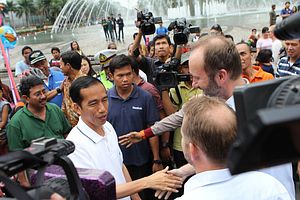Jakarta Governor Joko Widodo, or Jokowi as he is popularly known, is on track to be the next president of Indonesia. And if he continues his impressive performance as a public servant, he may soon emerge as the most credible leader in Southeast Asia.
Win or lose in the coming presidential polls, Jokowi has already changed Indonesian politics. He has demonstrated that Indonesian democracy, for all its flaws, could still allow a former furniture entrepreneur to succeed in electoral politics and emerge as a major contender for the country’s presidency.
Jokowi’s rise has seen him become mayor of the central Javanese city of Solo, governor of the nation’s capital in Jakarta, and now a presidential candidate, despite lacking either significant political ties or the wealth to bankroll his political career. He is not related to an influential family and he has no service in the military – both normally de rigueur for anyone hoping to flourish in Indonesian politics – yet he has won every election he has contested since 2005.
How to explain Jokowi’s enduring political appeal? Aside from his humble background, he delivered some high impact reforms in Solo and later in Jakarta that proved very popular with the masses. He issued health insurance cards and scholarship grants, and raised the minimum wage. Jokowi acquired the reputation of being an unconventional leader by making surprise visits to government offices urging improved delivery of vital social services.
Jokowi became popular at a time of rising public dissatisfaction with the administration of President Susilo Bambang Yudhoyono. Indonesia has enjoyed robust economic growth in recent years, but this has not been enough to attenuate the crippling poverty endured by many its citizens. Then there is the scourge of corruption, which has alienated many Indonesians and left many of the nation’s youth profoundly cynical about their political leaders. With his nonconformist credentials, Jokowi’s arrival on the political scene was seen as a refreshing change with the potential to rejuvenate Indonesian politics.
The popular upstart continued to surprise this year when he was chosen as a presidential candidate. Although his party underperformed expectations in the legislative elections, perhaps revealing the limitations of the “Jokowi effect,” but he is still the frontrunner in the July presidential race.
A Jokowi victory would be a significant boost to Indonesian democracy, potentially restoring confidence in government and inspiring a wave of reforms in the country’s elitist politics. However, his political value is not restricted to Indonesia. As president, Jokowi could embody the yearnings of ordinary citizens across Southeast Asia for greater political representation.
Certainly, Jokowi is not the first populist politician in the region – there are other opposition figures who are challenging the dominant parties in their countries. Unlike his counterparts, however, Jokowi has little political baggage. Moreover, he is not a scion of a powerful dynasty like Noynoy Aquino of the Philippines nor is he a wealthy businessman like Thaksin Shinawatra in Thailand. Both men aspire to be reformist icons concerned about the poor, but Jokowi has the credibility as an ordinary citizen who has made a difference.
Jokowi’s success could be replicated in other countries, and this makes him an ideal figure for reviving citizen movements in Southeast Asia. If that happens, the Jokowi phenomenon could be Indonesia’s most important export to its neighbors.

































